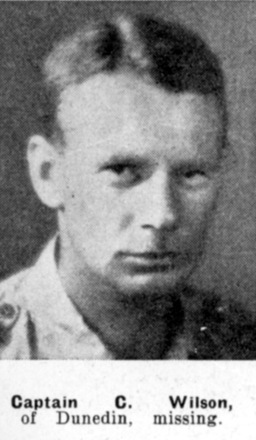Captain Clifford Wilson was an insurance clerk and Territorial officer when war began in 1939.
A GOOD RESPONSE
SPECIAL SERVICE FORCE MEDICAL EXAMINATION IN PROGRESS
FIRST DAY’S REGISTRATIONS Although the first heavy rush was over, the officers and clerks engaged in attending to applicants for acceptance in the special military force for service overseas or at home were kept busy again yesterday. The Dunedin total when the office closed on Tuesday night was 341, and yesterday’s applications increased it to 417. Medical examination began last evening and will be continued for the remainder of the week and probably right through next week. The area staff officer (Major A. Bongard) said yesterday that all eligible single men, at least, could expect notification to attend for medical examination within the next few days.
Officers of the Army Department are well pleased with the type of recruit that has been coming forward. "It is a good type," one of them remarked. "We have had company directors; sheep farmers, clerks, labourers — in fact, representatives of almost every class of occupation.'’ Among the most interesting of the registrations so far are those of an ex-Grenadier Guardsman, a former lieutenant in the Royal Engineers, and an ex-Royal Marine.
An excellent example was set to serving Territorials by two of their officers. Captains C. Wilson and R. S. Orr, who were the two first to make their applications. Following them were Captain R. G. McKinlay, Reserve of Officers of the Otago Regiment, and Captain E. E. S. Clark, Reserve of Officers of the Southland Regiment. Theirs were the first four registrations, but the day’s roll included a good sprinkling of serving and retired officers.
The task of coping with the applications is one requiring fairly extensive office organisation, and the checking and recording of the registrations has kept fully occupied a staff of five clerks and a typist, with three assistants at busiest period. The office at the Drill Hall is open from 9 a.m. until 5.30 p.m., after which the checking and filing and official dealing with the registrations has to be continued.
In addition to the many inquiries that have been made personally, the staff has received a number of postal inquiries. There were more than 20 in yesterday’s mail, and already about that number of forms had been sent out by mail in response to requests. Of course, those totals cannot yet be included in the official return since the registrations have not actually been made.
Registrations are being made in five groups. Group No. 1 Includes officers on both the reserve and the active lists. Group No. 1A is for retired or ex-officers, Group No. 2 is for single men, Group No. 3 for married men without children, and Group No. 4 for married men with children. The first day's registrations, grouped in their respective sections. were as follows:
DUNEDIN: Group 1 Captain Clifford Wilson, Captain Robert Sydney Orr... -Otago Daily Times, 14/9/1939.

20 Battalion, 2NZEF, was formed at Burnham camp at the beginning of October, 1939. After training it embarked for Egypt and trained further with the British Army while also doing patrol and guard duty. The first enemy action encountered by the 20th was a number of raids by the Italian Air Force after Italy declared war on Britain and France.
The growing German threat to Greece - which for a time successfully resisted an Italian invasion from Albania - prompted a move of British forces into the country. 20 Battalion was one of those units, greeted rapturously by the citizens of Athens upon disembarking and marching to their first Greek billet past the eerie sight of the German embassy, nazi flags and guards very much in evidence.
After the Allied forces' evacuation of Greece, Crete was the next place to be invaded. Clifford Wilson was put in command of No 8 Greek Regiment, and his 20 Battalion friends heard of his fate only later.
Thus ended the first day. The paratroops who had landed in the New Zealand sector had suffered heavy casualties, but 22 Battalion had been forced off Maleme aerodrome and the enemy now had a field where he could land reinforcements. Months later it was learned that one of the first battalion casualties was Major Cliff Wilson, attached to 8 Greek Regiment. When their area had been surrounded by paratroops Major Wilson and the other New Zealanders had assembled at a pumping station on a hill south of the reservoir. The station consisted of a small concrete compartment dug into the hillside. It was locked by a narrow steel door, in front of which the clay excavated from the hole had been heaped on either side of the entrance, making a sort of alley leading up to the door— ‘a slit trench with one end open’. The party took shelter inside the tanks, standing thigh deep in water in the darkness while Germans moved around in the vicinity. Unable to break out, the party was forced to remain in hiding. The next afternoon Major Wilson went out to investigate the position. He moved along, looking over the left-hand parapet, and had just called to the others to follow him — ‘Come down and have a go; there are about five of them down here’ — when he was killed instantly. Shortly afterwards the rest of the party was captured. - 20 Battalion, Official History.

No comments:
Post a Comment